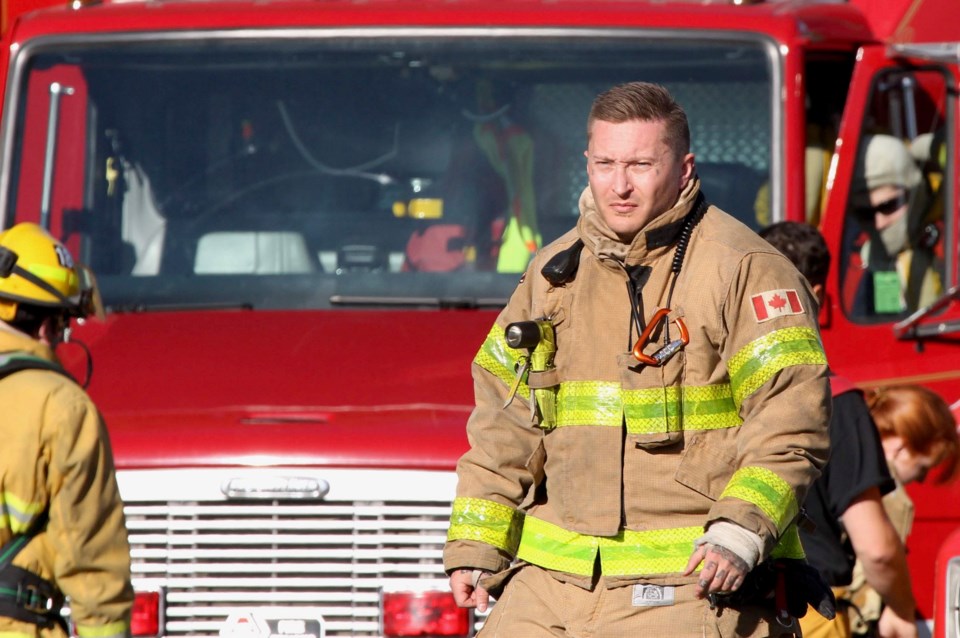Chad Cooper has had his scope of influence broadened within the firefighting industry to a provincial level.
Early this month, the Flin Flon fire chief was named second vice president of the Manitoba Association of Fire Chiefs (MAFC). Before then, he was a voting member of the MAFC for fire departments within the Clearwater district. He has held that position since taking over as chief of the Flin Flon Department in 2016.
The MAFC is a non-profit organization established to represent firefighters working in Manitoba by studying and discussing key issues affecting the industry, and working with the provincial government on various initiatives to enhance firefighting capabilities.
One of the issues Cooper considers important as he assumes his new role within the MAFC pertains to the transfer of payment following firefighting services provided at a motor vehicle incident. A resolution forwarded at the organization’s recent annual meeting – which was submitted by the Clearwater District – suggests that Manitoba Public Insurance (MPI) withhold insurance services to drivers who fail to pay an outstanding debt for fire services rendered.
“There’s still a lot of grey area with this as to whether or not MPI pays in cases of drunk driving or with the new marijuana laws coming into affect, there may be a lot more people under the influence on the roads and we have had no word from MPI on whether or not they would pay a bill out,” Cooper told The Reminder.
Besides taking on more responsibilities at the provincial level, the local fire chief is working at the national level as a member of the Canadian Association of Fire Chiefs’ (CAFC) Redefining Fire group. Cooper and several leaders in the industry are spearheading an initiative to outline the new and emerging roles of Canadian fire departments.
“We’re looking at doing a study on how different departments are providing services, and looking at the future of firefighting,” he said. “We’re considering how roles are changing in fire service and how we can further streamline delivery of services. It’s a fairly new committee. We’re looking at starting the study within the next month and, hopefully, will have a final report for all the fire chiefs across Canada by fall. It’s a pretty cool thing to be involved with. I was surprised that I got selected for it, but they wanted someone from Manitoba to be a part of the group.”
Back home in Flin Flon, Cooper has grown comfortable with his position on the local department. Now 33, the fire chief is working a job he has wanted since he was 12 years old. Cooper began his career as a volunteer fire fighter in Taber, Alta., then in 2006 graduated from firefighter training at the College of the Rockies in Cranbrook, BC.
His career resumed when he assumed positions in the Alberta oil patch, with the Canadian Armed Forces and with the North Atlantic Treaty Organization (NATO), where he fought fires on buildings and at airports at a military base in the Kandahar district of Afghanistan.
Before arriving in northern Manitoba, Cooper worked for a dozen years as deputy fire chief at an oil refinery in the United Arab Emirates.
“It’s been an amazing experience moving into this community,” Cooper said. “Everybody has been welcoming and the city council has been great in supporting the fire department. We’re now able to implement new technologies and our membership and morale is at an all-time high. Plus, our recruiting is at an all-time high.”
The Flin Flon Fire Department currently has 34 members with up to four others attempting to join at any given time. Cooper is the lone full-time, professional firefighter in the city. The rest of the department members are volunteers paid when they respond to emergency calls.
“I know they are struggling down in southern Manitoba with recruiting. It’s one of the biggest challenges for fire services with the increased demand in training and the balance between home-life, volunteer-life and meeting those training demands,” he said.




